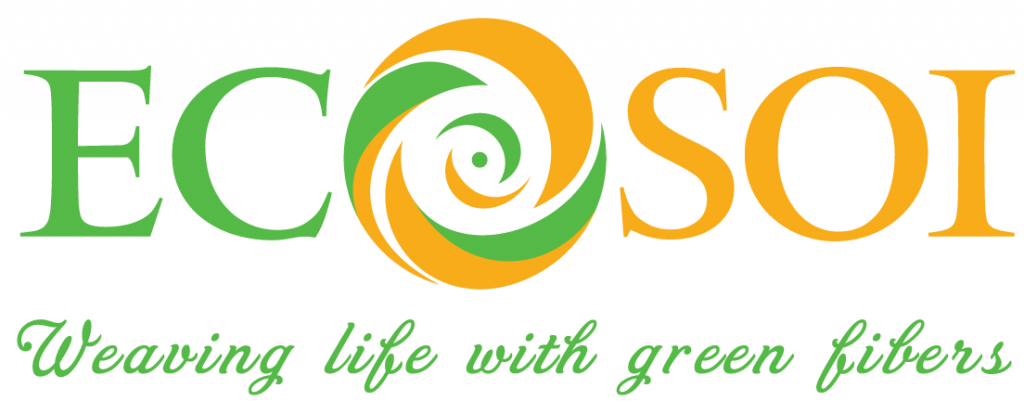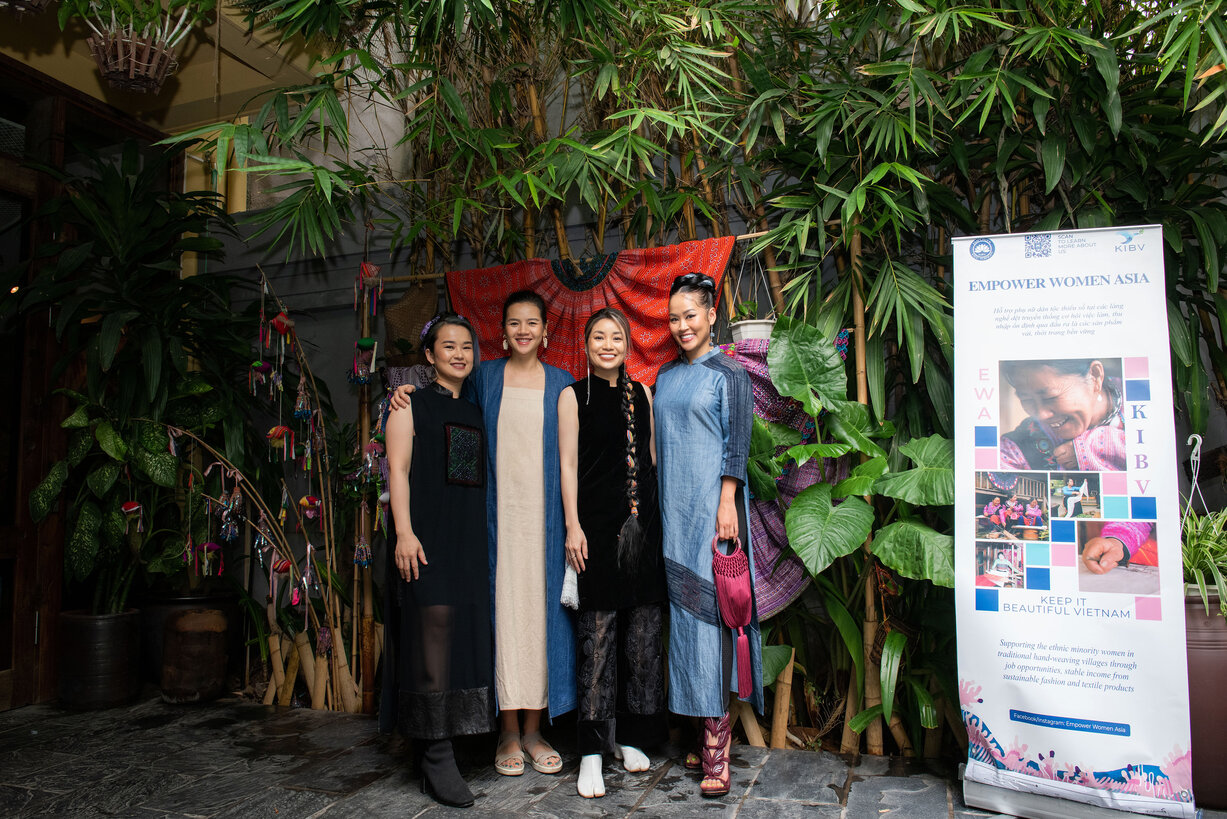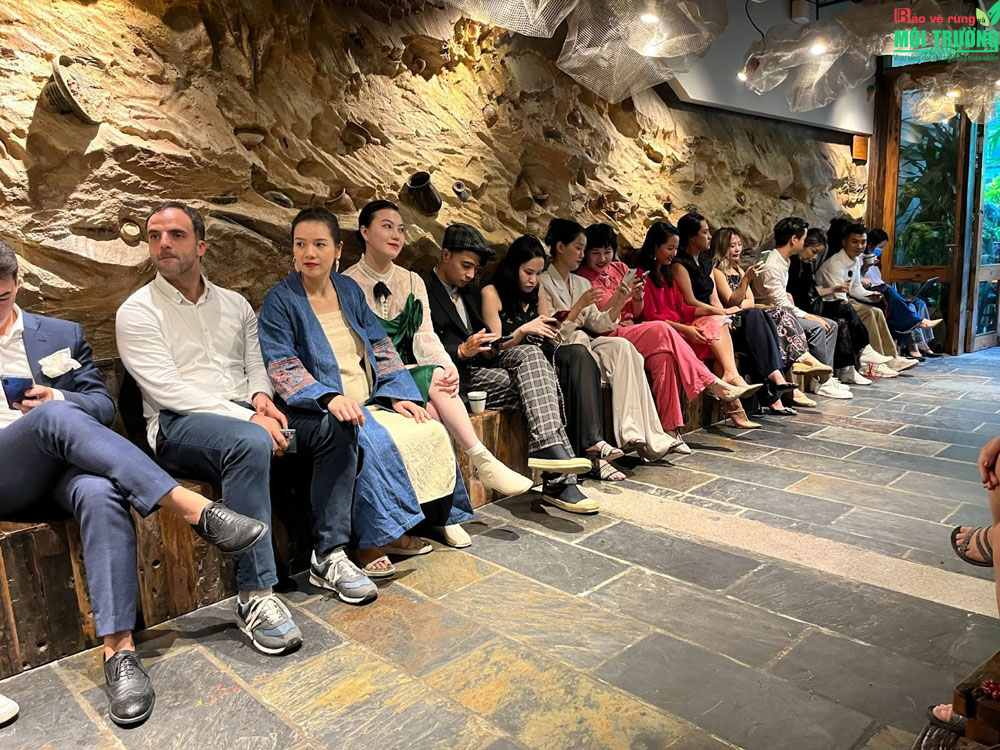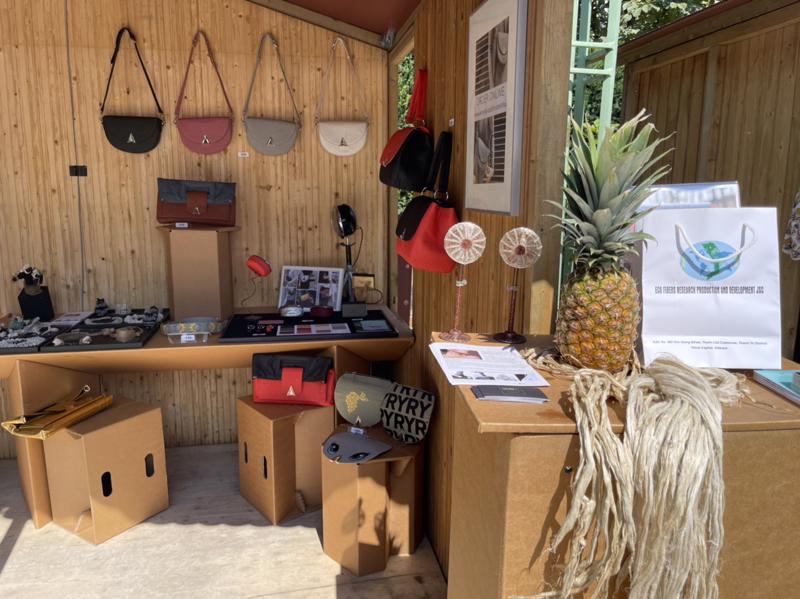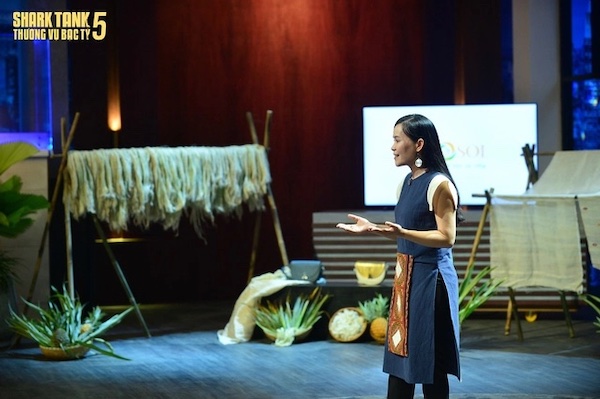Pioneers spun silk from pineapple leaves
When they saw the Western model wearing her pineapple silk dress performing in Switzerland, Nguyen Van Hanh and Vu Thi Lieu - co-founders of Ecosoi were so happy they wanted to cry.
A dress costs 5 - 6 million
Can't we be happy when garment companies are struggling to find green and sustainable raw material areas to meet the needs of exporting to demanding markets such as Europe and Japan, while the Production and Research Joint Stock Company Newly established fiber development (Ecosoi) has pioneered the exploitation of fiber from pineapple leaves, turning agricultural waste into resources.
Vu Thi Lieu said: "To be fair, pineapple fiber is superior to cotton. However, there are some points that are not as good as hemp or silk, but it is environmentally friendly and easy to convince demanding customers. In Europe, pineapple fiber has been used for many years to make imitation leather goods, and the price is very high. In Vietnam, Ecosoi is the first pineapple fiber producer in 2021, at Hanh Phuc Agricultural Cooperative (Quynh Luu, Nghe An).
The potential is huge because in industrial pineapple growing areas it is still possible to spin yarn, not just organic pineapple growing areas. Any pandan leaf over 60cm long is eligible while its maximum length is about 1. 2 m. The quality of pineapple fibers in Thanh Hoa and Nghe An is better than in the provinces in the South. Maybe due to the weather and farming methods, the leaves are thicker, longer, and more beautiful. On average, about 55kg of pandan leaves produce 1kg of yarn, depending on the quality, which can be purchased for 150,000 - 160,000 VND/kg, more than twice as much as cotton yarn.

From pineapple fibers, people make fabric, bags or sew them into clothes. The performance dress at the Swiss sustainable fashion products exhibition costs 5-6 million VND. Recently, we also sent scarves to the Miss for Peace Vietnam contest and were selected by the Organizing Committee because in addition to the use value, the environmental value also has humane value thanks to the spinning done by children. disability, weaving from traditional craft villages is at risk of disappearing.
Our output is currently 2-3 tons of yarn/month, all exports go to the UK, Philippines, Japan, striving to reach 7-8 tons/month in 2023. Pineapple growing areas are all over the North - Central - South so raw materials are very available. In addition to export, pineapple fiber can also partly meet the needs of Vietnam's textile and garment industry. Pandan leaves are difficult to decompose because they contain a lot of cellulose, so people often mill them and burn them, even spraying them with pesticides to dry them quickly to burn them, but when processed, they are the fiber product that the world market needs. Our model is that the company is the center, linked with satellite groups, groups, and pineapple growing cooperatives, transferring technology to farmers and then purchasing the fiber. Machines for separating yarn, carding yarn, and whipping, the simplest type costs 40 million/machine and can be done."
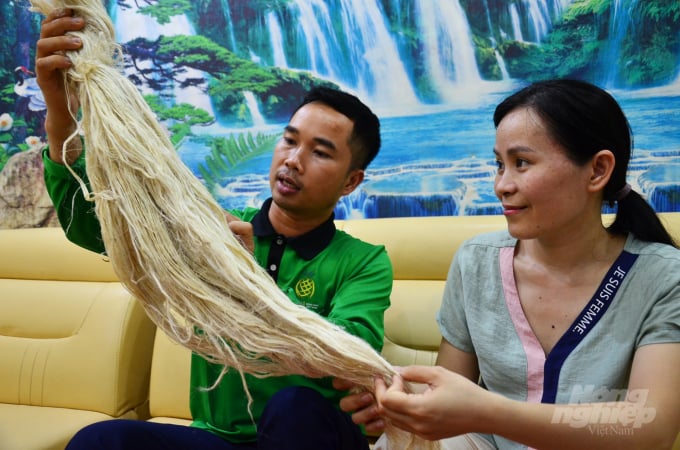
Going back to the guy who makes Hanh Phuc pineapples, Hanh accidentally knew me through an acquaintance and sent a box of pineapples as a gift. When I peeled it and ate it, it seemed to contain the golden sunshine, fragrance and sweet nectar of the earth and sky of Nghe An. It's delicious because of the love given by a complete stranger. It's even more delicious because it's grown in a safe way. I've been in the news for many years, exposed to many areas of clean vegetables, clean chicken, clean fish, and clean fruit, but I've rarely seen an area growing clean pineapple that's always sprayed to irritate the eyes. , stimulating, weeding...
Because I was curious about those delicious pineapples, I met Hanh at the first decent Green Market in Hanoi. Surprisingly, that guy used to be a ship captain. Having a few days off each month, unlike many of his colleagues who go to karaoke and drink whenever the ship docks, he often goes to farms to learn about clean agriculture.
Hanh's father passed away when Hanh was 3 years old. In 2015, when he saw that his mother was old and weak, he decided to go back to farming to take care of her. But he did not farm in the usual way but in a safe way because when participating in charity activities, entering the Ho Chi Minh City Oncology Hospital, seeing patients lying everywhere, suddenly thought of the real cause. dirty products. At first, he chose native crops such as peanuts and beans to grow and produce seasonally rather than off-season because, like giving birth, forced premature birth would indicate sick children.
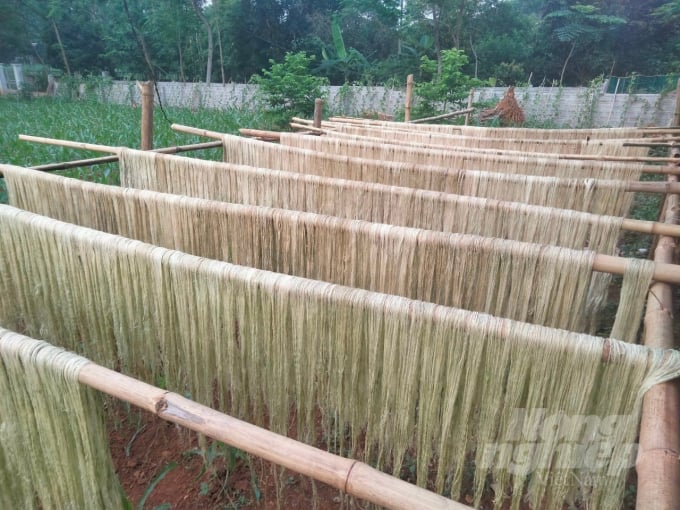
Happy pineapples
While working as a farmer in Dien Hoang commune (Dien Chau, Nghe An), when she had the opportunity to visit her cousin in Tan Thang commune (Quynh Luu), 28km away, Hanh decided to settle down in the land that was originally Ben Nghe farm, a high hill. , burning sun. Farmers here grow pineapples in the usual way, which means there are still households that use herbicides, eye irritants, growth stimulants, poison themselves and sometimes don't even dare to let their children eat their products. go out. Goods sold to traders sometimes have to be thrown away because they cannot be sold, making Hanh feel sad.
People can grow pineapples in a safe way, but it is difficult to sell them because the traders' requirements are beautiful appearance, even eyes, big fruit, shiny skin, green picking, mass cutting and cheap price. In 2015, he bought 2.7 hectares of hill and spread beans on it to improve the soil by milling both the stem and fruit, spraying microorganisms to treat fungus, and then starting to grow pineapples, fertilizing with manure and composted fish fluid. Industrially grown pineapples take 12 - 14 months to harvest, but organically grown pineapples take 18 months. In fact, people harvest 30 - 35 tons/ha. Hanh's first crop only harvests less than half. He brought the pineapple home to burn incense for his ancestors, peeled it and invited his mother to enjoy it. The old feeling suddenly came back, when each family planted a few pineapple trees in the garden to enjoy. Although the fruit was small, it had a special, sweet, and naturally fragrant aroma.
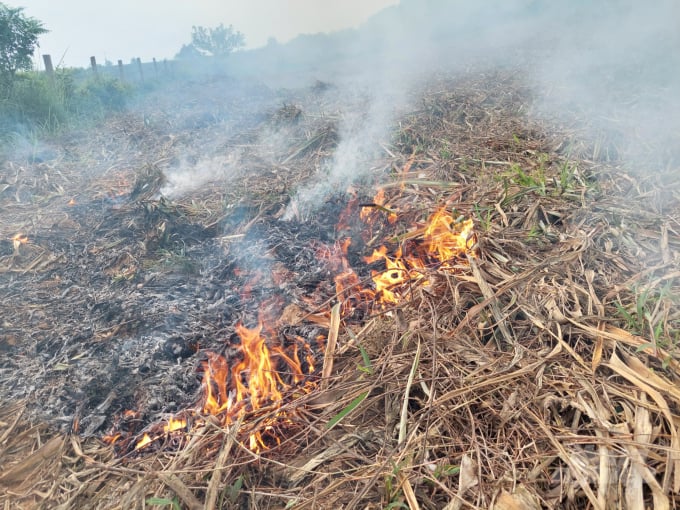
Making delicious pineapples, but at first selling them was very difficult. Sometimes at 9 - 10 o'clock at night, he even took them to the intersection of 36 Hoang Mai, more than 10km from the farm to send them, but was refused because the cart was full. had to take her home at 1 - 2 am. The saddest thing is when a customer orders a lot and runs out of products, but when there are a lot of products, the customer doesn't need them because it's also the pineapple season, the price is much cheaper, while Hanh's pineapples are only sold at a stable price. .
Many times, seeing her child working so hard, his mother cried because working as a captain, Hanh received food, water, and a high salary, while when she returned to work as a farmer, she had to make up for her losses; worry about hiring workers, when the season calls for people who don't have to roll over and do the work; If you can't sell it, you have to process it, but if you want to process it, you have to take care of the paperwork to ensure food safety and hygiene; After drying, you can't sell them right away, you have to wait until the end of the fresh pineapple crop, until the cold season.
Hanh comforted her mother: "I raised 5 brothers and sisters. No matter how hard the day is, being able to come home to my mother at night is already happiness (a distance of 28km in the morning and return in the afternoon). But in the future, if I earn billions of dollars and you lose me, how can I buy you again? Loving her child, her mother left home to go to the fields with him. In 2019 she passed away. For more than 7 months since discovering the disease, he took care of his mother from eating to holding and bathing without any hesitation.
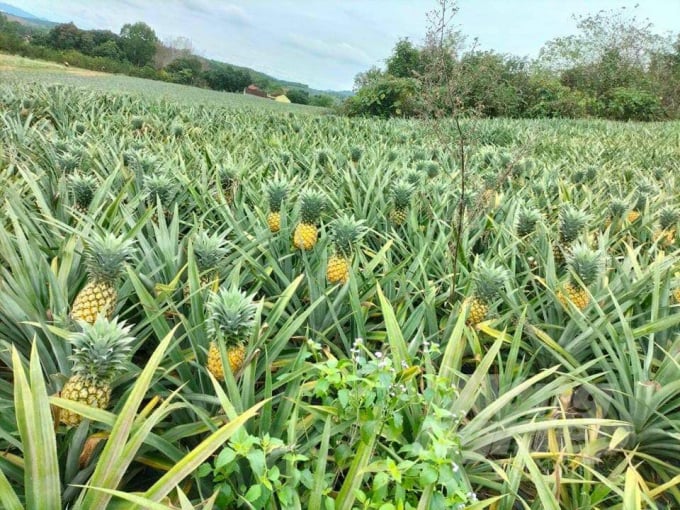
Working in agriculture can't grab and get rich quickly, but in return you will have many brothers with the same direction, creating an ecosystem from North to South with many clean products, gathering together through peaceful fairs and green markets. kind.
When working with people, Hanh often advises them to gradually convert to safe, then to organic, rather than converting immediately because they will be overwhelmed. To attract more people to follow him, all costs from testing soil and water to technical training on how to make IMO, fertilizer, biological pesticides, purchasing tools, and setting up a processing factory are all his own. let go. Currently, Hanh Phuc Agricultural Cooperative, of which he is the Director, has 10 cooperative members with a total area of 40 hectares.
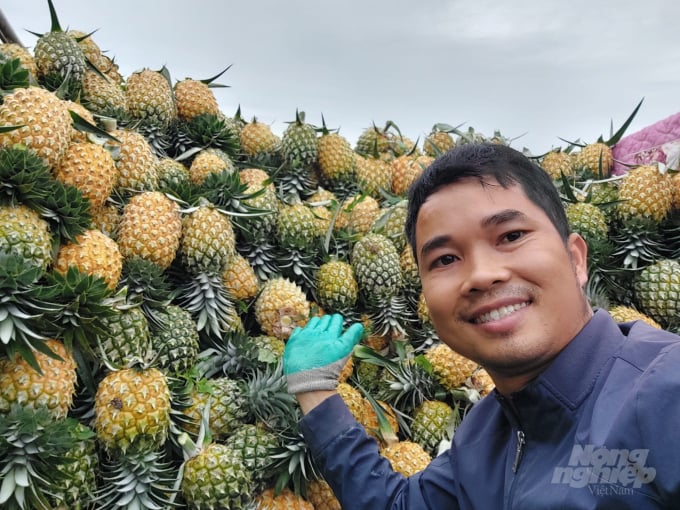
Why is it called Happy pineapple? I ask. Hanh answered: "It's because there are no toxic chemicals in the farming process, ensuring the health of farmers, creating clean products that ensure the health of consumers. Having health means having happiness. The biggest fear is that people use banned Chinese drugs to stimulate the eyes and stimulate pineapples because the requirement of many factories is that the eyes must be even for quick stamping, forcing people to follow.
To make clean pineapples, you must build a brand and have your own customer base, otherwise it will depend on the traders. Although it takes a lot of work, the selling price is higher than the price of industrially grown pineapples (10,000 VND/kg compared to the price of 3,000 - 5,000 VND). /kg). This year, there are a few households that will separate to do their own business. I also feel happy without fear of competition because my members have stood on their own, built their brands, and provided a variety of products. Many people in society will benefit."
During her passion for farming, it was the pineapple that made Hanh's destiny. His wife is an agricultural engineer and a member of the Kind Agriculture Alliance. While working on a forest garden project in Kien Giang, they met and traveled thousands of kilometers to be together. Earlier this year, a lovely baby was born.
